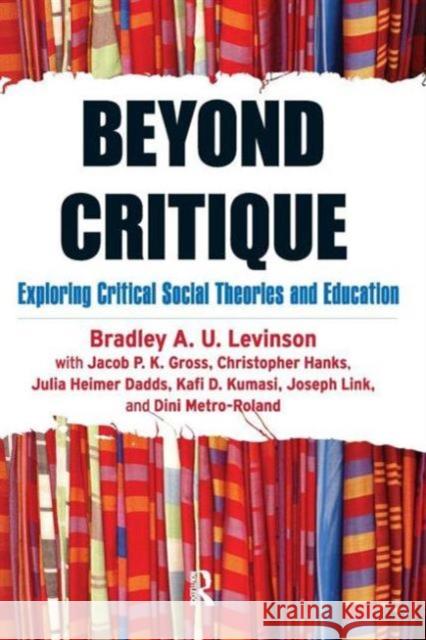Beyond Critique : Exploring Critical Social Theories and Education » książka
Beyond Critique : Exploring Critical Social Theories and Education
ISBN-13: 9781594518584 / Angielski / Miękka / 2011 / 272 str.
Beyond Critique : Exploring Critical Social Theories and Education
ISBN-13: 9781594518584 / Angielski / Miękka / 2011 / 272 str.
(netto: 223,85 VAT: 5%)
Najniższa cena z 30 dni: 216,55
ok. 16-18 dni roboczych.
Darmowa dostawa!
" Features of this innovative text: "Introduces the primary people, concepts, and issues in the field of critical social theory, including Marx and Weber, Gramsci, the Frankfurt school and Habermas, Bourdieu, Foucault, feminism, and critical race theory.Accessibly written for students by a group of experienced educators and scholars who explain concepts using examples.Defines and broadly expands the critical social theory tradition.What is social theory, and what is critical about critical social theories? How can critical social theories enrich and illuminate our understanding of educational processes and thereby contribute to progressive social transformation? This book introduces educational practitioners, students, and scholars to the people, concepts, questions, and concerns that make up the field of critical social theory. It guides readers into a lively conversation about how education can and does contribute to reinforcing or challenging relations of domination in the modern era. Written by a group of experienced educators and scholars, in an engaging style, Critical Social Theories and Education introduces and explains the preeminent thinkers and traditions in critical social theory, and discusses the primary strands of educational research and thought that have been informed and influenced by them.An engaging introduction defines and situates critical social theory in relation to other kinds of social science and educational theories. A chapter on foundations and forerunners discusses the origins of a critical social theory tradition in the work of Karl Marx, Max Weber, G.H. Mead, and others. Full chapters explicate the life trajectories and key concepts of Antonio Gramsci, members of the Frankfurt School and Jurgen Habermas, Pierre Bourdieu, Michel Foucault and post-structuralism, feminism, and critical race theory. These chapters also feature a section that traces and maps out some of the education scholarship employing these critical social theories with accompanying bibliographies as well as a section that more closely examines a few key examples of such scholarship, identifying the ways that critical social theory concepts get taken up in research. Finally, not content to limit the discussion to conventionally acknowledged critical theories, a final chapter, called Friendly critiques and fellow travelers, introduces and discusses a number of related theories, assessing their potential to contribute to education for social transformation. Among the theories discussed here are liberalism, pragmatism, world-systems, critical globalization and postcolonial theories, Latin American critical thought (liberation theology, dependency theory, Fals Borda and Freire, participatory democracy), deep ecology and spirituality, and practice-centered critiques of power (Flyvbjerg, Holland, Erickson)."











